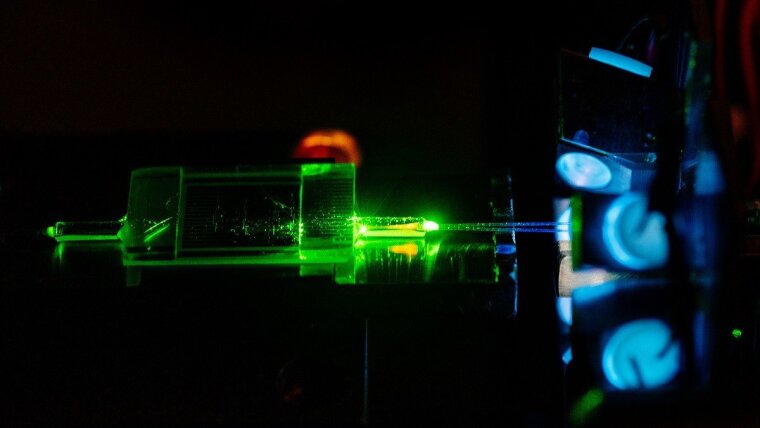
- Light
Published: | By: Desiree Haak (Fraunhofer IOF), editing by Christian Helgert
The German Federal Ministry of Education and Research (BMBF) is funding a consortium led by the Stuttgart-based quantum start-up Q.ANT with 45 million euros. The consortium partners are contributing a further eight million euros. The funding will be used to build a demonstration and test facility for photonic quantum computer chips and other quantum computing components. The consortium also includes the Friedrich Schiller University Jena and the Fraunhofer Institute for Applied Optics and Precision Engineering IOF. Both are taking on development tasks worth 12.6 million euros in the project.
The consortium headed by Q.ANT is developing technologies for photonic quantum computing and preparing them for industrial use. Q.ANT, a wholly owned subsidiary of machine tool manufacturer TRUMPF, has recently presented a process that enables the production of very powerful quantum computer chips. By depositing highly specialized light channels on silicon wafers, quanta can be guided, controlled, and monitored in these so-called "photonic integrated circuits" with virtually no losses, even at room temperature.
Current quantum computer chips have to be cooled down to temperatures close to absolute zero (‑273.15 °C). Thus, they are not suitable for direct on-chip coupling with classical computer architectures. The new photonic chip process will simplify the symbiosis of quantum computers and conventional mainframe computers. It also forms the basis for the joint research project "PhoQuant".
"The funding is an important signal for Germany as a location for innovation," says Michael Förtsch, CEO of Q.ANT. "We are at the beginning of the quantum computing age and the global race for market share of this future technology has begun. This funding is an important building block for a quantum computer made in Germany." The "PhoQuant" research project will run for five years.
Researchers from Jena contribute know-how of light sources
The consortium under the industrial leadership of Q.ANT is made up of a total of 14 German companies as well as applied research institutes and universities – including the Friedrich Schiller University Jena and Fraunhofer IOF: "Within the framework of this project, the Friedrich Schiller University and Fraunhofer IOF are developing integrated optical quantum light sources and low-loss integrated optical and fiber-optic interferometers as elementary building blocks of photonic quantum computers," explains ACP co-director Prof. Dr. Andreas Tünnermann. "In addition to expertise in quantum optics and photonics, this requires know-how in hybrid assembly and integration technology. We introduce our expertise to this highly dynamic project in order to reach our common goal together with all participating companies and institutions: to realize a powerful photonic quantum computer."
Quantum computer chips and vacancies
From today's perspective, fields of application for a computer with quantum computer chips are, for example, in the chemical industry, biomedicine, or materials science. "Cooperation between top researchers and companies is the key to quantum computer chips from Germany and related jobs. Only if industry, universities, and applied research institutes cooperate closely can successful industrial products also emerge from the know-how of Germany as a science location," says Förtsch. The project partners want to present a first prototype within two and a half years. In five years at the latest, a quantum computer chip is to be created which can perform far-reaching calculations.
The research project involves a total of 14 partners
- Q.ANT GmbH
- Paderborn University (UPB)
- University of Münster
- Fraunhofer Institute for Applied Optics and Precision Engineering IOF
- Friedrich Schiller University Jena
- Ulm University
- HQS Quantum Simulations GmbH
- Humboldt University of Berlin
- Fraunhofer Institute for Photonic Microsystems
- Swabian Instruments GmbH
- TEM Messtechnik GmbH
- ficonTEC Service GmbH
- FU Berlin
- Menlo Systems GmbH